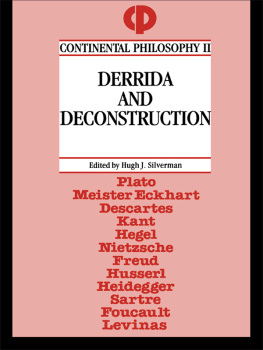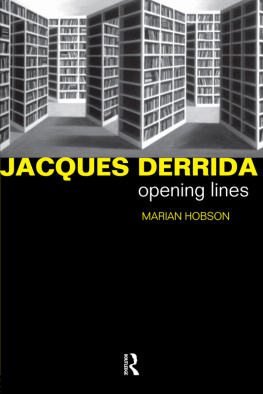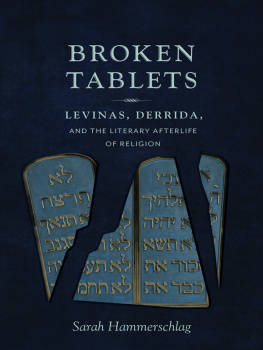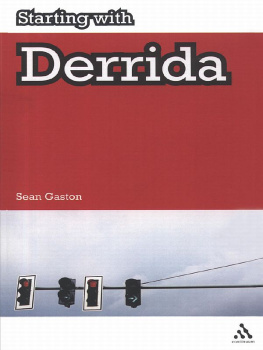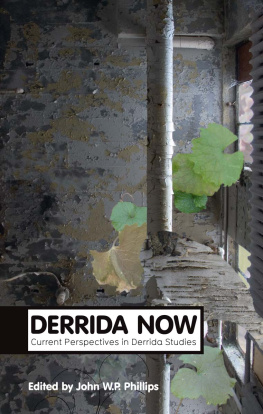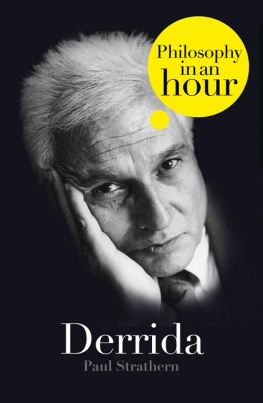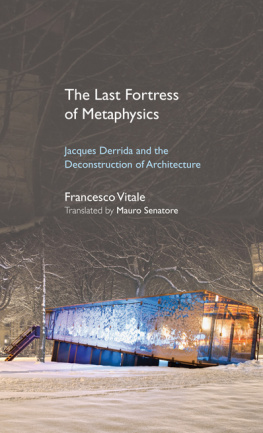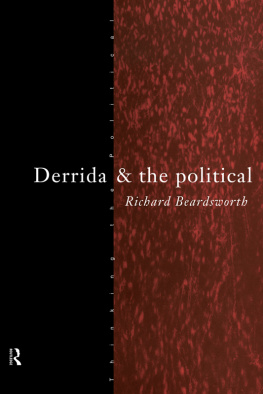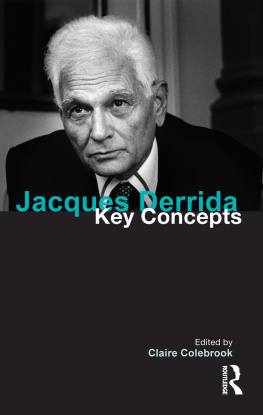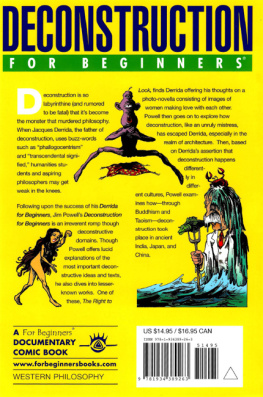Derrida Jacques - Derrida and Deconstruction
Here you can read online Derrida Jacques - Derrida and Deconstruction full text of the book (entire story) in english for free. Download pdf and epub, get meaning, cover and reviews about this ebook. City: London;New York, year: 1989;2011, publisher: Routledge, genre: Religion. Description of the work, (preface) as well as reviews are available. Best literature library LitArk.com created for fans of good reading and offers a wide selection of genres:
Romance novel
Science fiction
Adventure
Detective
Science
History
Home and family
Prose
Art
Politics
Computer
Non-fiction
Religion
Business
Children
Humor
Choose a favorite category and find really read worthwhile books. Enjoy immersion in the world of imagination, feel the emotions of the characters or learn something new for yourself, make an fascinating discovery.
- Book:Derrida and Deconstruction
- Author:
- Publisher:Routledge
- Genre:
- Year:1989;2011
- City:London;New York
- Rating:3 / 5
- Favourites:Add to favourites
- Your mark:
- 60
- 1
- 2
- 3
- 4
- 5
Derrida and Deconstruction: summary, description and annotation
We offer to read an annotation, description, summary or preface (depends on what the author of the book "Derrida and Deconstruction" wrote himself). If you haven't found the necessary information about the book — write in the comments, we will try to find it.
Derrida and Deconstruction — read online for free the complete book (whole text) full work
Below is the text of the book, divided by pages. System saving the place of the last page read, allows you to conveniently read the book "Derrida and Deconstruction" online for free, without having to search again every time where you left off. Put a bookmark, and you can go to the page where you finished reading at any time.
Font size:
Interval:
Bookmark:

Hugh J.Silverman
ASSOCIATE EDITORS
Stephen H.Watson
Forrest Williams
David Wood
ASSISTANT EDITORS
J Barry
James Clarke
James Hatley
Brian Seitz
BIBLIOGRAPHER
Hlne Volat-Shapiro
ADVISORY BOARD
Hazel Barnes
Robert Bernasconi
Edward S.Casey
Jacques Derrida
M.C.Dillon
Thomas R.Flynn
Michel Haar
Irene E.Harvey
Patrick A.Heelan
Don Ihde
Dominique Janicaud
Dalia Judovitz
John Llewelyn
J.N.Mohanty
Graeme Nicholson
Tony OConnor
Adriaan Peperzak
William Richardson
John Sallis
Charles E.Scott
Jacques Taminiaux
Gianni Vattimo
Bernhard Waldenfels
Wilhelm Wurzer

First published in 1989 by Routledge
29 West 35th Street, New York, NY 10001
11 New Fetter Lane, London EC4P 4EE
This edition published in the Taylor & Francis e-Library, 2004.
1989 Hugh J.Silverman
All rights reserved. No part of this book may be reprinted or reproduced or utilized in any form or by any electronic, mechanical, or other means, now known or hereafter invented, including photocopying and recording, or in any information storage or retrieval system, without permission in writing from the publishers.
Library of Congress Cataloging in Publication Data (Continental philosophy; 2)
Bibliography: p.
Includes index.
1. Derrida, JacquesCriticism and interpretation.
2. Deconstruction. I. Silverman, Hugh J. II. Series.
PN98.D43D46 1989 194 8826403
British Library Cataloguing in Publication Data
Derrida and deconstruction.(Continental philosophy; II).
1. French philosophy. Derrida, Jacques, 1930. Critical studies
I. Silverman, Hugh J. II. Series 194
ISBN 0-203-16899-2 Master e-book ISBN
ISBN 0-203-26433-9 (Adobe eReader Format)
ISBN 0-415-03093-5 (Print Edition)
ISBN 0-415-03094-3 Pbk
Continental Philosophy-I addressed the major developments in the continental mode of philosophizing from the time of Merleau-Pontys last lectures on philosophy and non-philosophy in 1961. It provided a rather comprehensive account of directions and practices in continental philosophy in the past quarter of a century. CP-II focuses on one of those major aspects of continental thought, namely, deconstruction and the corresponding philosophical practice of Jacques Derrida. In contrast to CPI in which the task was to explore major figures and their practices in the contemporary context, CP-II takes up the methods and orientations of deconstruction with respect to some of the most important names in the history of philosophy. Each of the essays in this volume assesses Derridean deconstruction as a philosophical practice in relation to dominant historical figures in the western tradition. This list of names is brought up to the contemporary era and even into the past several decades in terms of Heidegger, Sartre, Levinas, and Foucault. And while Levinas (who had studied with both Husserl and Heidegger) is the only one of those considered who continues to write, his study of Husserl, published in the early 1930s, introduced Sartre to Husser-lian phenomenology long before Levinass own philosophy was at all known.
Naturally, the set of philosophers presented in CP-II is selective. Yet it is representative of those many significant periods and orientations in the history of philosophy that preoccupy continental thinking as it is understood today. Even with this limitation, there will be other names that ought to have been included here. However, our task has been to demonstrate aspects of Derridean deconstruction in relation to the history of philosophy and its highlights. Comprehensiveness and exhaustiveness has not been our concern. We wanted to offer a general account, not a total account (as Foucault would have said). Given limitations of space, we opted for in-depth studies of those figures considered rather than a superficial overview.
For many years Jacques Derrida taught the history of philosophy at the cole Normale Suprieure in Paris. Recently appointed Directeur dtudes at the cole des Hautes tudes en Sciences Sociales, Derridas teaching is no longer officially limited to lectures in the history of philosophy. Indeed, only since he began teaching at Yale (and now at the University of California at Irvine) for a portion of the academic year has he taken up interdisciplinary contemporary topics in an institutional capacity. Thus many of his formative essays were devoted to readings of important figures in the history of philosophy. This second volume of Continental Philosophy captures the spirit as well as the content of those historical studies by following a more or less chronologicaldiachronic accounting of Derridas relation to Plato, Meister Eckhart, Descartes, Kant, Hegel, Nietzsche, Freud, Husserl, Heidegger, Sartre, Levinas, and Foucault.
While we have set out to present facets of Derridean deconstruction in relation to these major figures in the history of philosophy, our task has also been to demonstrate the principal aspects of deconstruction as philosophy. While other studies of deconstruction bring out the dominant features of the strategy and method, this volume explores not only what Derrida has said about figures in the history of philosophy but also how his practice both draws upon and rereads the tradition itself. The contributors to this volume examine what Derrida has written about the various philosophers in question, studying and developing the character, features, and implications of the relation itself. At the same time, they demonstrate their own manner of philosophizing in the continental tradition and bring out aspects of Derridean readings that have import for contemporary philosophical understanding. The contributors themselves are philosophers who have already written not only on Derrida and deconstruction but also on the corresponding philosopher whom they discuss. Hence they are each particularly well qualified to treat the conjunction of Derrida and the figure in question. Furthermore, the bibliography offered at the end of this volume provides not only a full listing of Derridas publications in French and in English but also a broad spectrum of writings on Derrida and deconstruction available in English. Along with the essays themselves, this bibliography should provide a substantial reference tool for anyone interested in exploring this topic further.
Jacques Derrida was born in 1930. While his philosophical training was done at the cole Normale Suprieure, where he subsequently taught until quite recently, his writings have had an impact upon a broad spectrum of thinking in the human sciences and cultural criticism. Although he received his doctorat dtat in Paris only recently (1980) and on the basis of his many publications, Der-ridas writings have had an even more significant effect outside France than at home. This element of alterity at the center is important for understanding continental philosophy in general. The term itself was introduced by British philosophers who referred to the philosophy practiced on the European continent as other than that which they themselves did. At first, and in its original version, continental philosophy was characterized almost exclusively as some type of phenomenology (transcendental, existential, or hermeneutic). Analytic philosophy (positivist, linguistic, or ordinary language) set itself off against these accounts of phenomenology. Gradually, even in Britain, continental philosophy came to characterize an aspect of philosophy (a legitimate area of philosophy) that could be taught as part of the philosophy course offerings. With the burgeoning of interest in continental thought, this area became a mode of philosophizing in its own righteven one that could be practiced by British and American philosophers irrespective of what was happening on the continent itself. Indeed, often some of the most adventuresome and significant work in continental philosophy has been occurring outside the European continent (though still owing its debt to certain traditions and modes of thinking prevalent there in this century). Hermeneutics, semiotics, critical and dialectical theory, structuralism, post-structuralism, French feminism, deconstruction, and post-modernism all came to operate as continental thought whether in Europe or elsewhere. That Jacques Derrida oftenlectures and teaches in the United States (and on occasion in Britain) intensifies the non-geographical location of what is now known as continental philosophy.
Font size:
Interval:
Bookmark:
Similar books «Derrida and Deconstruction»
Look at similar books to Derrida and Deconstruction. We have selected literature similar in name and meaning in the hope of providing readers with more options to find new, interesting, not yet read works.
Discussion, reviews of the book Derrida and Deconstruction and just readers' own opinions. Leave your comments, write what you think about the work, its meaning or the main characters. Specify what exactly you liked and what you didn't like, and why you think so.

